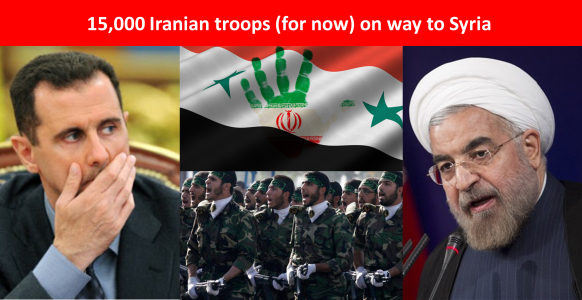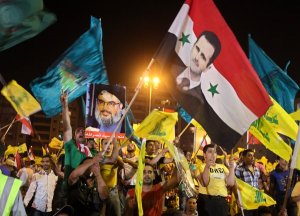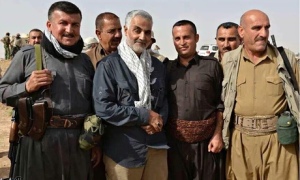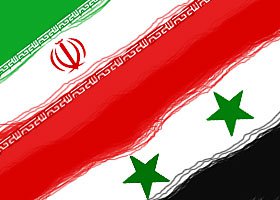
The relationship between Tehran and ISIS is a complicated one:
- Iran consistently accuses the US/Saudis of creating ISIS and thus supporting terrorism.
But in reality, ISIS was born out of the vacuum or power and stability in Syria and Iraq, a vacuum that was filled by Tehran.
- Iran and ISIS are enemies and are at war in the fields of Syria and Iraq.
But fighting ISIS legitimizes Iran’s political and military involvement in Syria and Iraq which suits Tehran’s regional aspirations.
- Iran has taken the lead, as well as the costs and the glory, of fighting ISIS.
But fighting ISIS has also forced Tehran to cooperate with the “Great Satan” and other regional enemies, a situation filled with tension and mistrust.
- ISIS (Islamic State of Iraq and Syria) has not yet targeted Iranian territory.
But fighting ISIS may result in an invasion by ISIS of Iranian soil in the future.
- Both ISIS and Tehran’s raison d’aitre is to promote a global Islamic revolution, although one is Sunni and another is Shiite.
But Khameini is constantly calling for a global unity of Muslims under Islam regardless of religious factions
- Tehran has a long history of promoting Islamist extremist/terrorist militias such as Hezbollah, Hamas, Taliban etc… for its agenda so, why not ISIS?
But Tehran modus operandi with terrorist militia is based on Tehran controlling the agenda and ISIS isn’t listening to Tehran.
Whatever the case may be, Tehran will continue to wage a tactical war against ISIS but underneath it all, ISIS may be serving Tehran’s regional and global strategy so well that if ISIS did not exist, Tehran would have had to invent it.
Iran Also Created ISIS
 There is evidence that proves that leaders of ISIS were once supported by the US and Saudi Arabia in an effort to promote US interests in the Middle East but those ties were severed once ISIS “went rogue”. Meanwhile, the civil war in Syria and the weakening of the Iraqi government, both of which are connected directly to Tehran, created the instability that ISIS required: there were enough disgruntled Syrians and Iraqis to join ISIS and enough weak areas in which wars could be waged. The fact that the US pulled out of Iraq only made it easier for both Iran and ISIS to march in.
There is evidence that proves that leaders of ISIS were once supported by the US and Saudi Arabia in an effort to promote US interests in the Middle East but those ties were severed once ISIS “went rogue”. Meanwhile, the civil war in Syria and the weakening of the Iraqi government, both of which are connected directly to Tehran, created the instability that ISIS required: there were enough disgruntled Syrians and Iraqis to join ISIS and enough weak areas in which wars could be waged. The fact that the US pulled out of Iraq only made it easier for both Iran and ISIS to march in.
ISIS is Iran’s Tactical Enemy and Strategic Ally
 Tehran may be fighting ISIS in the battlefields in Syria and Iraq but without ISIS, Tehran’s military involvement in these countries might warrant a foreign military intervention just as its involvement in Yemen brought on a military reaction by Saudi Arabia.
Tehran may be fighting ISIS in the battlefields in Syria and Iraq but without ISIS, Tehran’s military involvement in these countries might warrant a foreign military intervention just as its involvement in Yemen brought on a military reaction by Saudi Arabia.
There is growing criticism within and outside of Iran against the regime in Tehran for supporting Assad in his civil war. The cost of supporting Assad is believed to be approximately $10-$15 billion a year and now that Tehran is sending troops to Syria, the cost is bound to grow financially and in the loss of Iranian lives as well.
As to Iraq, Tehran is eager to bring Baghdad and has been supporting the Shiite factions there for the past few years. Baghdad is a key city in the vision for an Iranian empire as outlined by Rouhani’s chief adviser on Ethnic and Religious Minorities, Ali Younessi.
With Lebanon already under Iranian control, Syria and Iraq on the way, and Yemen and Afghanistan in its sights, Tehran can finally begin the process of building a regional empire.
In contrast, the US remains Tehran’s strategic enemy even if it is Tehran’s tactical ally against ISIS.
A Common Enemy Creates Strange Allies
 When ISIS began its rampage last year (29th of June, 2014), the tone from Iran complacent: IRGC generals spoke about ISIS as an isolated issue with no real repercussions to Iran. But as ISIS stormed through Iraq, the same generals changed their tune: Tehran, as a regional leader and a friend of Baghdad and Damascus, would eradicate ISIS…in fact, Qods chief Suleimani claimed that only Iran could wipe ISIS off the map.
When ISIS began its rampage last year (29th of June, 2014), the tone from Iran complacent: IRGC generals spoke about ISIS as an isolated issue with no real repercussions to Iran. But as ISIS stormed through Iraq, the same generals changed their tune: Tehran, as a regional leader and a friend of Baghdad and Damascus, would eradicate ISIS…in fact, Qods chief Suleimani claimed that only Iran could wipe ISIS off the map.
The nuclear negotiations between Iran and the P5+1 suddenly created a situation in which Western forces, specifically the US, were ready to fight beside the Iranian forces in the effort to eradicate ISIS. This strange coalition of enemies was fragile from the start and the Iranians wasted no time in criticizing the US for its “ineptitude” on the battle field.
Will ISIS Wage War on Tehran?
 ISIS, even within its name, makes no territorial claims over Iran. And even if it did, it would seem pointless: ISIS is a Sunni movement which is trying to carve out a Sunni kingdom within Syria and Iraq and would never be welcome by the people of Iran who are Shiites.
ISIS, even within its name, makes no territorial claims over Iran. And even if it did, it would seem pointless: ISIS is a Sunni movement which is trying to carve out a Sunni kingdom within Syria and Iraq and would never be welcome by the people of Iran who are Shiites.
Furthermore, ISIS is winning in Syria and Iraq because both of these countries lack any stability at this point in time while Iran’s regime is firmly entrenched with a powerful army. So, even in their wildest dreams, the leaders of ISIS probably do not view themselves entering triumphantly through the gates of Tehran. But they will probably find a way to bring the war to Iran on its borders with Iraq.
Two Sides of the Extremist Islamic Coin
 Yes, ISIS is Sunni and Iran is Shiite. But both are striving for a world that will be Islamic and religious. They do not strive for a modern and updated version of Islam but want their citizens to be part of the ancient version of Islam based on Shaariah laws.
Yes, ISIS is Sunni and Iran is Shiite. But both are striving for a world that will be Islamic and religious. They do not strive for a modern and updated version of Islam but want their citizens to be part of the ancient version of Islam based on Shaariah laws.
The chances of a unity between Iran and ISIS seems as close as a unity between Tehran and Riyadh but one must not forget Khamenei’s
fervent vision of a Global Islamic Awakening and his calls lately for unity among all Muslims of the world.
The Fine Line Between a Terrorist and a Freedom Fighter
 The leaders in Tehran were quick to use ISIS in an effort to redefine terrorism: Rouhani’s first foreign policy initiative was to create WAVE (World Against Violence and Extremism) using ISIS as the clear definition of terrorism. Obviously, Rouhani conveniently forgot to mention Tehran’s ties with terrorist militia. Suddenly all the Iranian leaders placed themselves firmly and righteously against extremism, violence and terrorism.
The leaders in Tehran were quick to use ISIS in an effort to redefine terrorism: Rouhani’s first foreign policy initiative was to create WAVE (World Against Violence and Extremism) using ISIS as the clear definition of terrorism. Obviously, Rouhani conveniently forgot to mention Tehran’s ties with terrorist militia. Suddenly all the Iranian leaders placed themselves firmly and righteously against extremism, violence and terrorism.
But what about Tehran’s support of Hezbollah, Hamas, Taliban etc…What about Tehran’s support for the Houthis rebels in Yemen? What about Tehran fighting its wars in Syria and Iraq with Hezbollah and Taliban militia? And what about the atrocities carried out by these same militia in Syria and in Iraq?
Whether Tehran likes it or not, in many cases, ISIS and Tehran are very similar in many respects.
In reality, ISIS is really a localized problem – 10-15 thousand militia on a rampage in Iraq and Syria. But the horrors of ISIS and Tehran’s involvement in both these countries make the fight against ISIS a global one. Paradoxically, Iran needs ISIS as a way to free itself from its connection with terrorism and as a card of legitimacy to spread its military power over Iraq and Syria.
Related Posts:
 The Huffington Post ran an article on Eight Arguments Against an Iran Nuclear Deal — and Why They Are Wrong. It’s worth reading. It goes through 8 reasons why people are skeptical of a nuclear deal with Iran with rebuttals on why the nuclear deal is the only viable solution at this time.
The Huffington Post ran an article on Eight Arguments Against an Iran Nuclear Deal — and Why They Are Wrong. It’s worth reading. It goes through 8 reasons why people are skeptical of a nuclear deal with Iran with rebuttals on why the nuclear deal is the only viable solution at this time.










 Tehran may be fighting ISIS in the battlefields in Syria and Iraq but without ISIS, Tehran’s military involvement in these countries might warrant a foreign military intervention just as
Tehran may be fighting ISIS in the battlefields in Syria and Iraq but without ISIS, Tehran’s military involvement in these countries might warrant a foreign military intervention just as 


























